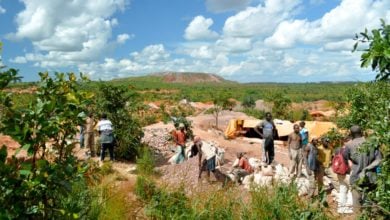In the midst of claims of vote rigging and fraud, Robert Mugabe and his ZANU-PF party secured a victory in the recent elections in Zimbabwe. Taking 61 percent of the presidential vote, and a two-thirds majority in parliament, ZANU-PF will not only hold the presidency but also control a large enough majority to amend the constitution.
The opposition Movement for Democratic Change’s leader Morgan Tsvangirai declared the vote tainted, and has called for new elections.
MDC leaders have declared that they will not participate in government institutions, and have given indications that they may take their claims about the outcome of the elections to the streets and the courts.
Election observers from the African Union and Southern African Development Community have declared the elections free and fair, and are urging the MDC to stick to legal channels although the AU has noted some “irregularities.”
The United States and other Western nations are currently keeping mum about their approach to the outcome; however, they have raised questions about the vote, and their allegiances have always lain with the MDC. Undoubtedly the MDC approach of total rejection is predicated on their belief they can rally Western support to their cause.
The Zimbabwe elections crisis is the result of a divide between a pro-imperialist opposition force, with a strong base in the white-settler farmer community, and a nationalist regime that has struck at the pillars of the colonial/neo-colonial economic setup.
Elections born of crisis
The recent elections are the result of a Government of National Unity formed in 2009. The GNU was formed after presidential elections in which the MDC refused to participate in a run-off, protesting vote manipulation. Thus, Robert Mugabe, Zimbabwe’s leader since independence in 1980, remained in power.
Those elections followed a period of serious turmoil in the country during which Mugabe and his supporters drew the ire of Western powers for responding to land seizures by veterans of the independence struggle by launching a land reform program in 2001. Western imperialist nations resorted to sanctions and wholehearted support of the MDC in an attempt to remove ZANU-PF from power by causing economic and social dislocation.
Mugabe did not submit to the sanctions regime and instead pursued business deals with East Asian nations and sought greater stakes in major mineral concerns for Zimbabweans. Nonetheless, the campaign of regime change waged against Zimbabwe created economic turmoil leading to mass dissatisfaction that buoyed the MDC.
The MDC attracted the support of the West by standing for the big settler farms and mining companies.
During the interim period, a constitution supported by both parties was voted on, but ZANU-PF played a more significant role in the unity government. With some of the sanctions lifted, the economy stabilized, and land reform began to bear fruit. This allowed ZANU-PF to consolidate its support. While it is true that election conditions were less than ideal, it seems likely that the improving economy and democratic, anti-colonial aspirations of broad masses of Zimbabwean people played a key role in the election results.
Centrality of land reform
Expropriation of land was the central pillar of the settler regime. Taxation and other forms of persuasion and control allowed the settlers to monopolize the land and forced Blacks to participate in the money economy. The need to work for wages, and the inability to own land created the large and cheap labor pool that allowed the mining industry to take off. The colonial economy was built on the foundation of the dispossession of African land.
This gives the current land reform significance, first as an attack on the most serious injustice of the colonial period. It would be meaningless to talk of self-determination, liberation or democracy if the monopoly of land continued to be held by a settler elite.
Second, by undermining a key pillar of the colonial economy, land reform undermines the traditional power of the settler elites and erodes the control exerted by the mining industry on the labor market. Land reform, by employing more people in agriculture, has the potential to raise urban wages by tightening the labor market while also stimulating production outside of the mining sector.
This could lead to a change in the way Zimbabwe relates to the world economy, moving it away from its role as a neo-colony.
Changes on the land
The land reform is far from the narrative of simply being a land grab by Mugabe and his “cronies” as portrayed in the imperialist media.
While initially the drastic upheavals and sanctions caused the agricultural sector to plunge into crisis, in the past few years things have stabilized, and in some areas shown significant improvement. While a comprehensive review of the land reform is beyond the scope of this article, hundreds of thousands have received land, and in many places it has resulted in real material gains for families.
In 2011, for example, the tens of thousands of recipients of land now farming tobacco made an average of $6,000 in a country where the annual salary rarely tops $1,000.
So while many will present the significant support for ZANU-PF as the result of voter fraud, it is clear that the land reform has touched a deep nerve for both its historic justice and its real and expected economic returns.
Defend Zimbabwe!
This is the crux of the matter in approaching this issue. It is possible to talk about ZANU-PF’s relationship with imperial powers in the past. But the issue is not the consistency of ZANU-PF’s anti-imperialist policies.
Mugabe and ZANU-PF have attracted the condemnation of the most powerful nations in the world, not because the former could never work with the imperialists, or that they are too “brutal,” but because their policies weaken the imperial hold on the country.
ZANU-PF will undoubtedly pursue policies we would critique, but the broad thrust of its policies undermine Western imperialist networks of power. The basic choice is between supporting the opposition, linked to the white-settler elite and international corporate interests, or lending critical support to the nationalist government challenging those two forces. The former direction leads toward the strengthening of a neo-colonial status quo while the latter speaks to the yet-to-be-completed democratic struggles of the liberation movement, and opens the road to a contested but self-determining future.
For progressive and revolutionary people, defending the government of Zimbabwe from imperialist slanders and intervention is of the utmost importance as the struggle with imperialism continues to escalate in the African theater.





